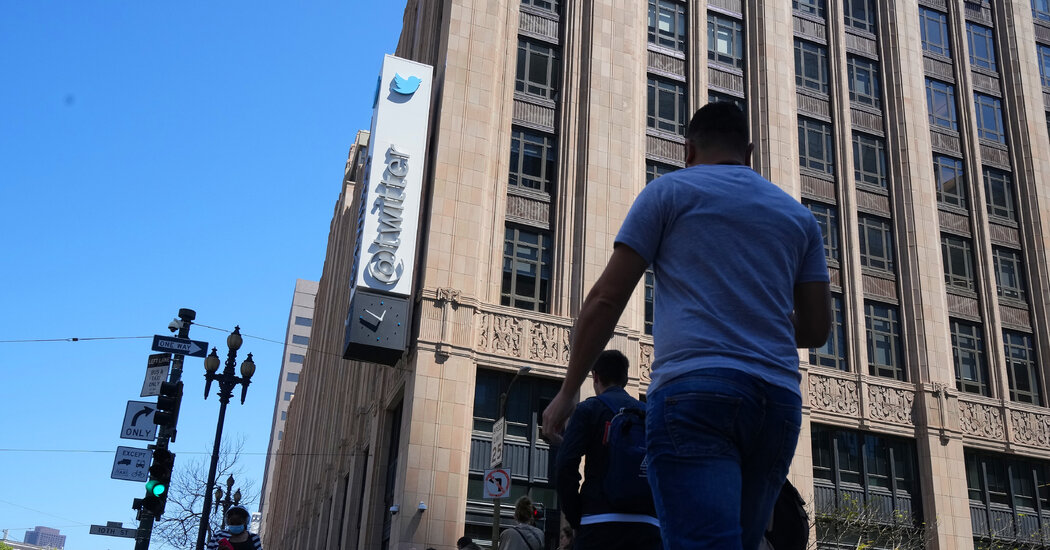When Elon Musk gave up funding for his bid to buy Twitter, he pledged to deposit $21 billion in cash.
Even for Mr. Musk, who is worth more than $200 billion, that’s a lot of money to think of. Most of his wealth is tied up in Tesla stock, and one of the most obvious ways to raise the money would be to sell some of those shares.
Given Tesla’s massive market cap and inclusion in major stock indices, almost anyone with a 401(k) probably owns some Tesla stock. The potential for Mr. Musk to sell some of his assets and spend less time on Tesla while shifting his focus to Twitter has raised questions about the outlook for Tesla’s stock price. The stock fell 12.2 percent on Tuesday, while the S&P 500 index fell 2.8 percent.
Tesla shares have lost about 20 percent of their value since Mr. Musk first revealed he had bought a large stake in Twitter, sparking takeover speculation. Jim Cramer, the frenetic host of CNBC’s “Mad Money”, accused Tesla of “hurt this market quite a bit.”
Did Musk Sell Shares To Fund His Twitter Bid?
It’s too early to know. Such sales should be reported to the Securities and Exchange Commission, but those reports are not immediate. It may take several days for the sale to be made public.
What impact would Musk’s sales have on Tesla’s stock price?
Even a sale of much of Mr. Musk’s Tesla stock probably won’t affect Tesla’s stock price for too long.
Mr. Musk is Tesla’s largest shareholder, owning approximately 17 percent of the company’s stock – approximately 175 million shares in total.
He would have to sell nearly 24 million shares at Tuesday’s price to generate $21 billion in cash. That’s about the average day’s trading volume for Tesla stocks — a lot, but not enough to overwhelm the market. On Tuesday, about 45 million shares were bought and sold.
Musk’s financing package for Twitter also includes $12.5 billion in loans backed by his Tesla stock. If Tesla’s stock falls far enough, lenders would require Mr. Musk to add collateral to back the loans, potentially forcing him to sell more shares to get the money.
Mr. Musk has previously sold large tranches of Tesla’s stock. Last year, he sold some 15 million shares in two months, worth more than $16 billion. Those sales did not appear to measurably reduce Tesla’s price, although it is not known whether the price would have increased had it not sold.
What Happens To The Rest Of The Market When Tesla Shares Drop?
Tesla is a component in both the S&P 500 and the Nasdaq composite index. In addition to being barometers of how stocks in the United States are performing, both indices are mirrored by numerous mutual funds that invest widely.
The S&P 500, considered the US benchmark index, weighs companies based on their market value. Tesla, valued at approximately $900 billion, is one of the most influential stocks in the index.
For every dollar that Tesla’s stock fell Tuesday, the S&P 500 lost 0.099 points, according to Howard Silverblatt, a senior index analyst at S&P Dow Jones Indices. That means the drop in Tesla stock accounted for nearly a tenth of the decline in the S&P 500 on Tuesday.
“So it had a very big impact,” said Mr. Silverblatt, but “not the highest.” Apple has much more impact at almost three times the valuation of Tesla. The stock’s 3.7 percent fall on Tuesday contributed more to the decline in the overall index.
So why did Tesla’s stock drop?
Tesla is a famously volatile stock. Tuesday’s 12.2 percent drop was the worst daily decline since September 8, 2020, when it lost about 21 percent of its value. But in the past six months, Tesla shares have fallen nearly 12 percent twice, on Nov. 9 and Jan. 27.
Some—sometimes including Mr. Musk—have suggested that Tesla is overvalued. Among those who believe in Tesla’s valuation, which is much higher than competing automakers relative to the size of their operations, much of the argument hinges on Mr. Musk’s stewardship. Even Tesla acknowledges this, calling it a risk in its most recent quarterly report: “We rely heavily on the services of Elon Musk, Tesla’s techno king, and our chief executive officer. While Mr. Musk spends a lot of time at Tesla and is very active in our management, he does not devote his full time and attention to Tesla.”
Much about Mr Musk’s plan to buy Twitter is unknown, including how involved he would be. “Tesla investors worry that Musk will spend too much time solving the social media giant’s problems and that will take away its laser-like focus on Tesla,” said Edward Moya, a senior market analyst at OANDA.
Or as Mr. Silverblatt put it, “It’s anticipating something that hasn’t happened yet. It will be a while before we know anything.”

